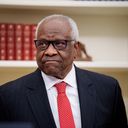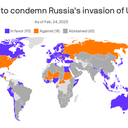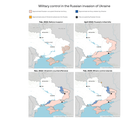Justice Thomas urges Supreme Court to reconsider free speech rules near abortion clinics
Justice Clarence Thomas issued a scathing dissent Monday after the Supreme Court declined to hear a case challenging free speech rights around abortion clinics, suggesting he wants to revisit the matter after the court ended the federal constitutional right to abortion in 2022.
The big picture: The high court's move marked a loss for abortion opponents who claimed their First Amendment rights are violated by laws that limit demonstrations near clinics.
- The Supreme Court majority did not explain their decision Monday in finding that the rules were in line with precedent set by Hill v. Colorado (2000). In that case, the high court held that the restrictions on speech-related conduct are constitutional because they regulate the places where some speech may occur, and not the speech itself.
Zoom in: Both Thomas and Justice Samuel Alito dissented, but only the former conservative justice filed writing explaining his reasoning.
- Thomas argued against the high court's decision not to revisit precedent set in Hill v. Colorado (2000), which upheld free speech in buffer zones around abortion clinics.
- "I would have taken this opportunity to explicitly overrule Hill," he wrote in his dissent.
- He argued the court erroneously treated the Hill case differently than others pertaining to the First Amendment because abortion was involved, writing, "Hill's abortion exceptionalism turned the First Amendment upside down."
State of play: The case in question on Monday, Coalition Life v. City of Carbondale, originated in Carbondale, Illinois, where local officials passed an ordinance prohibiting protesters from getting within 8 feet of patients at the clinic without consent.
- The ordinance, which reflected precedent upheld in Hill, was repealed last year but an anti-abortion group based in Missouri proceeded with a lawsuit against it, taking aim at similar laws across the country.
- Carbondale is located near Illinois' southern border and became a destination for people in nearby states that ban abortions.
Zoom out: In Hill, the high court upheld a state law "restricting peaceful speech" within 100 feet of abortion clinics, Thomas wrote in his dissent. He was on the high court at the time Hill was decided and dissented in the 6-3 decision.
- He argued that errors in the case "were numerous" and that the decision "contradicted more than a half-century of well-established First Amendment principles."
- He wrote: "This Court had never—and since Hill, has never—taken such a narrow view of content-based speech restrictions."
- Thomas said the Hill case "manipulated this Court's First Amendment jurisprudence precisely to disfavor 'opponents of abortion' and their 'right to persuade women contemplating abortion that what they are doing is wrong.'"
Between the lines: Thomas noted that he wants to revisit Hill in order to give clarity to lower courts, "who feel bound by it," particularly after Roe v. Wade was overturned in 2022.
- "Following our repudiation in Dobbs, I do not see what is left of Hill," he wrote.
- "Hill has been seriously undermined, if not completely eroded, and our refusal to provide clarity is an abdication of our judicial duty," Thomas wrote.
Go deeper: Abortion clinics brace for reinvigorated protests after Trump's pardons





/2025/02/24/1740405093695.gif)















